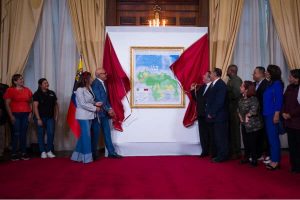By: Megan Mary Qualters
Impunity Watch Staff Writer
THE HAGUE, The Netherlands – The International Court of Justice (hereinafter ICJ) ordered provisional measures to protect Guyana’s rights in highly contentious territory dispute with Venezuela.
 |
Procedural History
In March 2018, the Co-operative Republic of Guyana’s government (hereinafter “Guyana”) filed proceedings against the Bolivarian Republic of Venezuela (hereinafter “Venezuela”). The legal issue is whether the Arbitral Agreement of 1899, which establishes the border line between Guyana and Venezuela, in a region called the “Guayana Esequiba,” is legally valid. Guyana claims it is valid and thus grants the Esequiba to Guyana, but Venezuela claims it is void and argues that the Esequiba is Venezuelan territory.
On October 23, 2023, Venezuela published a list of five questions it planned to use in a “Consultative Referendum,” to be held on December 3, 2023. The questions asked for support in rejecting the validity of the 1899 Award, the ICJ’s jurisdiction, and advocated for an accelerated plan to incorporate the Esequiba into Venezuela.
On October 30, 2023, in response to Venezuela’s questions and referendum plans, Guyana requested the ICJ issue provisional measures to prevent Venezuela from publishing its questions, ultimately asking the ICJ to protect its rights to the Esequiba region while the validity of the 1899 Award is pending.
On November 14 and 15, 2023, the ICJ heard oral arguments from both parties regarding the issue of provisional measures. Guyana asked the Court to order the following provisional measures, while Venezuela asked the court to reject the request.
- “Venezuela shall not proceed with the Consultative Referendum planned for 3 December 2023 in its present form;
- In particular, Venezuela shall not include the First, Third or Fifth questions in the Consultative Referendum;
- Nor shall Venezuela include within the ‘Consultative Referendum’ planned, or any other public referendum, any question encroaching upon the legal issues to be determined by the Court in its Judgment on the Merits . . .
- Venezuela shall not take any actions that are intended to prepare or allow the exercise of sovereignty or de facto control over any territory that was awarded to British Guiana in the 1899 Arbitral Award.
- Venezuela shall refrain from any action which might aggravate or extend the dispute before the Court or make it more difficult to resolve.”
Required Elements of an ICJ Provisional Measure
The ICJ, after affirming its 2020 Judgement that it has the necessary jurisdiction to adjudicate the claims of Guyana, turned to Article 41 of the ICJ Statute, which focuses on the preservation of rights claimed by parties in a case. To issue provisional measures the Court must find (1) the rights claimed by a party is plausible, (2) there is a link between the right claimed and the provisional measure requested, and (3) without the provisional measure “there is a real and imminent risk that” (4) “irreparable prejudice will be caused to the rights claimed before the Court gives its final decision.”
Here, the Court found that Guyana’s right to “preservation and protection of its right to the territory” is plausible. The Court notes that a right’s existence need not be proven, it only need be asserted plausible. Therefore, the Court need not determine which country has a right to the territory, but only that Guyana could have a plausible right to the Esequiba. The Court held that the existence of the 1899 Award and the dispute itself are sufficient to give Guyana a plausible right to the Esequiba.
Moreover, the Court found there is a link between the plausible right and the provisional measure sought. Guyana “seeks to ensure” that Venezuela does not prepare to, or exercise control of, the territory awarded to Guyana in the 1899 Award, which the ICJ considers a measure “aimed at protecting Guyana’s right which the Court has found plausible.”
Lastly, the Court turned to “Venezuela’s expressed readiness to take action with regard to the territory in dispute in these proceedings at any moment following the referendum scheduled for 3 December 2023” as sufficient evidence to find that Guyana is at serious risk of irreparable prejudice, and that the risk of this is urgent in a real and imminent sense.
ICJ’s December 1 Order
Due to the reasons above, the Court found it necessary to issue a provisional measure to protect Guyana’s right to the Esequiba. However, the Court found the measures provided need not match exactly what Guyana requested. Its resulting provisional measure consisted simply of ordering Venezuela to refrain from taking any action “which would modify the situation that currently prevails in the territory in dispute” and that both Parties “shall refrain from any action which might aggravate or extend the dispute before the Court or make it more difficult to resolve.” The ICJ has yet to determine the validity of the 1899 Award.
For further information, please see:
ICJ – Order of 1 December 2023 – 1 Dec. 2023
ICJ – Arbitral Award of 3 October 1899 (Guyana v. Venezuela) Latest Developments